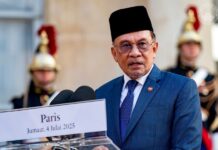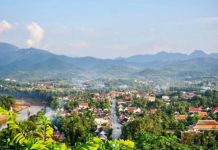Les autorités de Birmanie doivent dissoudre la commission d’enquête mise en place sur les violations des droits de l’homme dans l’État de Rakhine, car celle ci ne souhaite manifestement pas enquêter sérieusement sur de présumés crimes graves contre l’ethnie Rohingya, estime l’organisation de défense des droits de l’homme «Human Rights Watch».
Lors d’une conférence de presse tenue le 12 décembre 2018, Rosario Manalo, président de la commission d’enquête indépendante, a déclaré que la commission n’avait trouvé « aucun élément de preuve » pour étayer les allégations de violation des droits de l’homme au cours des quatre mois qui ont suivi l’ouverture officielle de son enquête.
Sa déclaration montre que la commission ignore les preuves et les témoignages recueillis par les enquêteurs des Nations Unies, le Département d’État des États-Unis et les organisations internationales de défense des droits de l’homme depuis le début des violences dans l’État de Rakhine en 2016.
«Le rejet par la commission du Myanmar de nombreuses informations sur les violations flagrantes des droits de l’homme contre les Rohingya montre clairement qu’il n’est pas sérieux de demander justice,» a déclaré Brad Adams, directeur de la division Asie à Human Rights Watch.
« Le Conseil de sécurité des Nations unies devrait cesser de donner crédit à cette commission et renvoyer la situation au Myanmar devant la Cour pénale internationale. »
Le Conseil de sécurité des Nations unies, qui a négocié sa première résolution sur la crise Rohingya, devrait voir dans les commentaires du président une preuve supplémentaire que la commission du Myanmar n’est pas une voie viable vers la justice pour les victimes d’exactions, a déclaré Human Rights Watch.
Retrouvez ci dessous l’intégralité du texte de l’appel de Human Rights Watch (en anglais)
Réagissez, commentez, corrigez sur redaction@gavroche-thailande.com
Myanmar: Disband Panel on Crimes Against Rohingya
Rakhine State Commission Delays Efforts at Justice; Claim of ‘No Evidence’ Shows Bias
(New York, December 19, 2018) – Myanmar should disband its commission of inquiry into abuses in Rakhine State because it is clearly unwilling to seriously investigate alleged grave crimes against ethnic Rohingya, Human Rights Watch said today.
At a news conference on December 12, 2018, Rosario Manalo, chair of the Independent Commission of Enquiry, stated that the commission had found “no evidence” to support allegations of human rights abuses in the four months since it officially opened its investigation.
Her statement shows that the commission is disregarding evidence and testimony collected by United Nations fact-finders, the United States State Department, and international human rights organizations since violence broke out in Rakhine State in 2016.
“The Myanmar commission’s dismissal of the extensive documentation of gross human rights abuses against the Rohingya makes abundantly clear that it is not serious about seeking justice,” said Brad Adams, Asia director at Human Rights Watch.
“The UN Security Council should stop giving credence to this commission and refer the situation in Myanmar to the International Criminal Court.”
The UN Security Council, which has been negotiating its first resolution on the Rohingya crisis, should view the chair’s comments as further evidence that Myanmar’s commission is not a viable path to justice for victims of abuses, Human Rights Watch said.
Some of the available evidence that the commission is ignoring is contained in the following reports:
The UN Independent International Fact-Finding Mission on Myanmar issued a 444-page report on September 18 detailing crimes against humanity, war crimes, and genocide by Myanmar’s security forces in Rakhine State and serious human rights abuses in Shan and Kachin States;
The UN Office of the High Commissioner for Human Rights issued a “flash report” in February 2017 documenting extrajudicial killings, sexual violence, arbitrary detention, torture, and other abuses by Myanmar security forces in Rakhine State after an attack on security posts in August 2016;
The US Department of State issued a report on September 24 detailing widespread and systematic human rights abuses against the Rohingya in Rakhine State;
Human Rights Watch has documented the widespread use of sexual violence against the Rohingya in Rakhine State, a massacre in the village of Tula Toli, and the widespread destruction of Rohingya villages in Rakhine State;
Amnesty International has documented serious human rights abuses by the military in Rakhine State and identified some of the military units and officers responsible for atrocities; and
The US Holocaust Memorial Museum and Fortify Rights issued a joint report in November 2017 documenting abuses by security forces including murder, rape and other sexual violence, arbitrary detention and enforced disappearances, and forced displacement.
“The record of Myanmar military abuses against the Rohingya is detailed and voluminous,” Adams said. “What more do Security Council members need to know to call for justice and accountability for grave international crimes?”
The four-member commission, set up by the Myanmar government in May, is the eighth domestic commission created since violence broke out in Rakhine State in 2012. None of these commissions have led to justice or accountability for human rights abuses such as extrajudicial killings, rape, torture, and arson.
Manalo, the commission’s chair, is a former deputy foreign minister of the Philippines. The commission also includes Kenzo Oshima, a former permanent representative of Japan to the UN, and two domestic commissioners chosen by the government.
One Myanmar member of the commission, Aung Tun Thet, has repeatedly demonstrated his bias, saying in March that Myanmar has a “clear conscience” and that “there is no such thing in our country, in our society, as ethnic cleansing, and no genocide.”
He also serves as chief coordinator of the Union Enterprise for Humanitarian Assistance, Resettlement and Development in Rakhine, which was formed in October 2017, and was a member of the 2016 national commission that rejected the findings of a UN report in its entirety.
The other Myanmar commissioner, Mya Thein, is a former chair of Myanmar’s Constitutional Tribunal.
The UN Fact-Finding Mission found that Myanmar’s military justice system has long failed to address the military’s massive human rights violations, while the civilian criminal justice system lacks independence and the capacity to respect fair trial standards.
It examined eight ad hoc inquiry commissions and boards created to address abuses in Rakhine State since 2012 and concluded that “none meets the standard of an impartial, independent, effective and thorough human rights investigation.”
It said that the government’s current Commission of Enquiry “will not and cannot provide a real avenue for accountability.”
The Fact-Finding Mission also concluded that the Myanmar government has proven itself “unable and unwilling” to investigate and prosecute crimes under international law.
This conclusion is important because the International Criminal Court, as a court of last resort, can only step in when it determines that justice in national courts is not possible.
After claiming they could find no evidence themselves, the commission asked victims to submit evidence with supporting audio and video recordings no later than January 2019.
This proposal raises serious concerns about the security of those who might come forward, Human Rights Watch said.
The government has not set up a victim and witness protection system, yet the commission stated that it will conduct “private interviews” with people who come forward to “verify their authenticity.”
With government representatives on the commission and the military officers implicated in egregious abuses still in command, victims and witnesses are likely to be at risk.
Some witnesses who have previously provided information about abuses have faced reprisals, while Reuters journalists Wa Lone and Kyaw Soe Oo have been imprisoned for their role in exposing a massacre in Rakhine State.
“Security Council members should call out the Commission of Enquiry for the diversionary and delaying tactic that it is,” Adams said.
“Waiting for this commission to finish its work is a waste of time that will only further delay accountability for grave human rights abuses against the Rohingya.”
For more Human Rights Watch reporting on Myanmar, please visit the website :
For more information, please contact:
In Bangkok, Phil Robertson (English, Thai): +66-85-060-8406 (mobile); or robertp@hrw.org. Twitter: @Reaproy
In New York, Linda Lakhdhir (English): +1-203-820-0372 (mobile); or lakhdhl@hrw.org. Twitter: @LLakhdhir
In New York, Param-Preet Singh (English): +1-917-586-1140 (mobile); or singhp@hrw.org. Twitter: @singhp_p
In San Francisco, Brad Adams (English): +1-347-463-3531 (mobile); or adamsb@hrw.org. Twitter: @BradMAdams
Chaque semaine, recevez Gavroche Hebdo. Inscrivez vous en cliquant ici.












